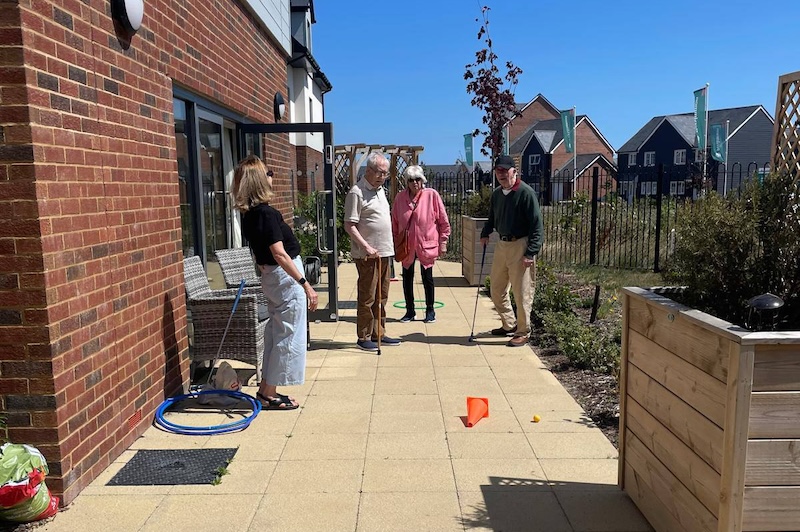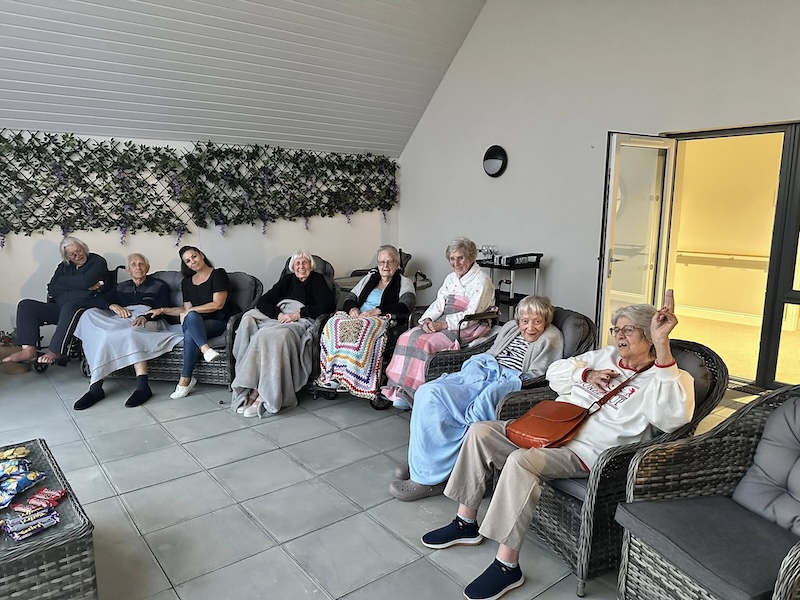How to Care For Someone Living With Dementia

Caring for a person living with dementia requires understanding, patience and specialised support. When it becomes challenging for a loved one to live safely and independently in their own home, a care home offers a safe and supportive environment designed to meet the complex needs of people with dementia. In this blog, we explore how care homes provide tailored care to people living with dementia and enhance their quality of life.
What Is Dementia?
Dementia is a general term for a group of symptoms affecting cognitive abilities and the way an individual experiences daily life. There are many different types of dementia, including Alzheimer’s, vascular dementia, Lewy body dementia and more. Dementia typically progresses gradually, leading to increasing difficulties with communication, understanding and remembering. People living with dementia also may experience changes in mood, behaviour and personality. For each individual, dementia affects them differently, so it is essential for their care to be person-centred.
Understanding dementia is key to providing compassionate and effective care. The condition influences how a person perceives their environment and interacts with others. This makes the support offered in a dedicated care home environment vital to maintaining quality of life, safety and dignity.
What Is Dementia Care in a Care Home?
Dementia care in a care home is a specialised form of support tailored to meet the individual needs of residents living with dementia. It combines personal care assistance with a safe and structured setting designed to reduce confusion and promote well-being. Staff in care homes receive specific training about dementia and how it affects somebody's life, equipping them with techniques to communicate effectively and manage symptoms with compassion. They will often also offer support groups for residents and their loved ones to help them feel at ease during their transition.
In care homes, dementia care involves more than just physical assistance with washing, dressing, eating and other everyday tasks. It includes creating familiar routines, offering social and cognitive stimulation through meaningful activities and providing emotional reassurance around the clock. The environment is often adapted to minimise risks, provide clear direction, support independence and help residents feel valued.
Care homes work closely with local services such as nurses, doctors and therapists to manage complex or changing health needs associated with dementia. Collaborative care ensures that personalised care plans truly reflect each resident's wishes and abilities.


Personalised Care and Needs Assessment
Every person with dementia has their own story and care needs. Care homes carry out thorough needs assessments before a resident moves in, ensuring care plans are tailored to their mental capacity and interests. This individualised approach helps professional carers deliver appropriate personal care and support as their dementia progresses.
The involvement of family members and close friends is always encouraged as care homes understand the importance of their existing support line and how it can help them get a true insight into residents' needs. Care teams often also work alongside healthcare professionals such as the resident’s GP or specialist dementia care teams to manage complex health needs and symptoms.
Managing Symptoms and Supporting Well-Being
People living with dementia commonly experience symptoms such as memory loss, sleep problems, anxiety, and changes in mood or behaviour. In a care home, these symptoms are actively managed with a combination of medical oversight and compassionate care.
Care homes also offer tailored social and recreational activities designed to stimulate cognitive abilities and encourage social interaction without overwhelming residents. This might include memory games, music therapy, reminiscence activities, gentle exercise, or creative workshops. Engagement in meaningful activities supports mental health and helps residents maintain confidence and purpose.
Emotional and Spiritual Support
Living with dementia can be emotionally challenging for residents and their families. Care homes provide emotional support through compassionate staff trained to recognise and respond to moments of anxiety or confusion. Familiar routines and a warm atmosphere can help residents feel comfortable and at home, from the moment they move in.
Some care homes also include spiritual support or access to community faith groups for those who wish, as they recognise the importance of spiritual well-being in holistic care. Group support and opportunities to connect with others facing similar challenges enhance residents’ sense of belonging and reduce feelings of isolation.
Collaboration with Family and Other Carers
Involving family members and other care experts is an essential part of dementia care, as they will be able to help you make decisions in the residents' best interests. Care homes always uphold open communication, keeping families informed about the resident’s health and well-being. Families are encouraged to visit whenever suits them, bring personal items to make rooms feel more like home and even participate in social events when possible.
Care homes may also provide support groups, helping relatives manage the emotional demands of a caring role. This partnership between professionals and families ensures that residents’ care respects their history and preferences while offering comprehensive support.

Dementia Care at Caraway House Care Home
At Caraway House Care Home in Selsey, we understand the complex and changing needs of people living with dementia. Our dedicated team of professional carers and nursing staff provide personalised, compassionate care designed to enhance daily living and maintain dignity, from the early stages all the way through to more complex dementia. With comfortable living spaces, tailored activities, and a warm community atmosphere, our residents can feel safe and comforted around the clock.
We also understand how difficult the transition into care is for loved ones, so we provide support to both you and your relatives. Whether you have a specific question or wish to just come for support, we are here for you every step of the way.
Alongside our first-class dementia care, we also offer residential care, nursing care and respite care in Selsey. Before somebody moves in, we take the time to get to know them and create a care plan that fully outlines each person's care needs, history, preferences and dietary requirements.
If you are considering dementia care for a loved one, we offer a welcoming environment with a focus on familiarity and expert care tailored to each individual. To find out more, get in touch and book a tour. We can't wait to give you a warm welcome and show you what makes our home so special.






